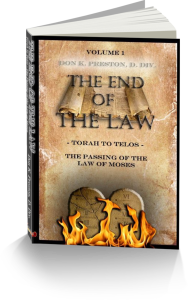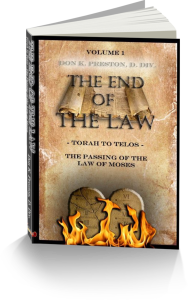Present Tenses in 1 Corinthians 15: Gnomic Or True Present Tenses? – #2


The Present Tenses in 1 Corinthians 15: Gnomic Or True Present Tenses
Part Two
Be sure to read part one of this important issue.
In the first installment, I noted that in two formal debtates, Bill Lockwood and Bruce Reeves tried to dismiss Paul’s extensive use of the present active indicatives and the present passive indicatives, by claiming that Paul used those present tenses in a “gnomic” that is to say, a timeless sense. Now, the fact is that Paul used the present tenses some 29 times in 1 Corinthians 15, and the only times that Reeves or Lockwood would appeal to the gnomic sense is when Paul used them to speak of the resurrection! This amounts to special pleading to say the least!
Also in the first installment, I noted that in 1 Corinthians 15 Paul uses the language of Israel’s festal calendar, which Paul said – using the present tenses in Colossians 2– “are a shadow of the good things about to come.”I noted that in three key passages, Israel’s final three, eschatological feast days, were spoken of as types and shadows of the coming– the about to come- realities foreshadowed in those feast days.
It is important to realize that neither Lockwood or Reeves – or any futurist – believes that the Judgment– at the sounding of the Trumpet – has occurred. Since the New Moons reference was to Rosh Ha Shanah as a shadow of coming realities, i.e. the Day of Judgment which both Lockwood and Reeves believe is yet future, then of necessity, the present tenses in Colossians 2 are true temporal present actives. They prove that the Law had not yet passed when Paul wrote, since the Judgment, foreshadowed by Rosh Ha Shanah, had not yet come. Jesus was very clear: “Not one jot or one tittle shall pass from the law until it is all fulfilled.” To put it another way:
The New Moon feast day- Rosh Ha Shanah – (Feast of Trumpets) foreshadowed the final judgment.
The final judgment had not been fulfilled when Paul wrote Colossians– per the futurist.
Therefore, Rosh Ha Shanah remained as a foreshadowing of the final judgment when Paul wrote Colossians – (and will remain as a type and shadow of that event until that event fulfills the New Moon festival).
Likewise, no futurists believe that Christ has come again in fulfillment of Hebrews 9:28. Thus, Yom Kippur, described in Hebrews 9, remains unfulfilled.
And neither Lockwood, Reeves or any futurist believes that the resurrection harvest– which was foreshadowed by the Feast of Harvest (Succot / In-Gathering, etc.) has been fulfilled.
If the Judgment, the Second Coming, the resurrection have not been fulfilled, then the Jewish feast days (what so many want to call the Ceremonial Law) has not been fulfilled! And if those feast days have not been fulfilled then it is entirely inappropriate – it is simply wrong — to say that the Law of Moses was nailed to the cross. It is entirely wrong to say that the entirety of the Law has been fulfilled.
Make no mistake: nothing was more foundationally, fundamentally “the law” than the feast days. They constituted a huge portion of the “jots and titles!” Just read Exodus, Leviticus and Numbers to see what I am saying. Those feast days regulated Jewish life and service in the temple. They were the basis of all sacrifices. Thus, it is literally impossible to argue that Jesus did not have the Jewish feast days in mind in Matthew 5:17-18: “Not one jot or one tittle shall pass from the law until it is all fulfilled.”
If those feast days, particularly the last three feast days, were still shadows of the coming realities as demanded by the exegesis above, and if (since) they were a fundamental and massive part of the “jots and tittles” of “the law” then Jesus’ words are inescapable: “Not one jot or one tittle shall pass from the law until it is all fulfilled.” It would be patently impossible for anyone to prove that those feast days were not part and parcel of the “jots and tittles” of “the law.”
Some commentators claim that the “ceremonial law” of Torah passed at the cross, but that the Decalogue remains valid. (E. G. Greg Bahnsen, Theonomy in Christian Ethics, (Nagadoches, Tx., Covenant Media Press, 2002), 226). This is the standard Sabbatarian view also, but it is a self-defeating argument. The “ceremonial” law was the Festal Calendar, with all of its sacrifices and sabbaths. In other words, the so-called “ceremonial law” contained the last three, eschatological feast days which pointed to the Judgment, the Second Coming and the Resurrection! Thus, until what those last three feast days pointed to was fulfilled then none of the ceremonial law could pass! Clearly, they were not fulfilled at the cross.
So, if the ceremonial laws– i.e. the feast days – passed away, then they were fulfilled. Remember, Jesus said they could not pass away until they were fulfilled. But, if they were fulfilled then the Judgment, the Second Coming and the Resurrection have been fulfilled! It is totally inconsistent, illogical and un-Biblical, to say that the “ceremonial law” has passed away, and yet, affirm a yet future eschatology. What this means is that if you affirm a yet future Judgment, Second Coming and Resurrection, you cannot claim that the present tenses in Colossians 2 and 1 Corinthians 15 were “gnomic” i.e. without temporal significance. But, if they were still shadows of the coming realities then we must honor the temporal parameters (delimitations) of the texts that tell us that the typological import of those feast days pointed to what was coming, not millennia away, but. “in a very, very little while, the one who is coming will come and will not delay.” Those shadows pointed to what was “about to come”, Colossians 2:17 / Hebrews 10:1, from mello, in the infinitive, which carried with it the idea of imminence. (See the Blass-DeBrunner Greek Grammar on this).
Bruce Reeves stated on the first night of his debate with Neubauer in response to a written question by Neubauer, that his eschatological hope was in fact the same eschatological as Israel. The debate began 7-20-20- at the Olsen Park church of Christ in Amarillo, Tx.. Video is archived on their site.
(This is a departure from the traditional church of Christ position that says the entirety of the Law and Israel as God’s covenant people passed at the cross. Numerous debate opponents have told me emphatically that their eschatological hope is NOT the same as the hope of Israel. Thus, Reeves is departing from the church of Christ traditional view).
This is a completely fatal admission. If his eschatological hope is the same as Israel, then until Israel’s promises are fulfilled, Israel– Old Covenant Israel – remains God’s covenant people – See Romans 11:25-27! If Reeves’ eschatological hope is the same as Old Covenant Israel, that hope was grounded in the feast days of Israel. Would Reeves argue that he is still looking for the fulfillment of the last three feast days of Israel’s calendar? If he is, he is thereby admitting that they have not passed away, but remain “shadows of the good things to come.”
Anticipating a rejoinder. It might be said by the futurists: Well, yes, the Feast Days were typological of the Judgment, Second Coming and Resurrection, but, those things clearly have not been fulfilled, therefore, we must take the present tenses in the gnomic sense.
The first problem with this is that it is presupposition, it proves nothing. It assumes that the objector’s concept of those eschatological events is correct, i.e. that the end time events are to be literal, visible, physical and belong to the end of the current Christian age. But, why would Israel’s feast days point to the end of the Christian age, and the end of time?
The second problem is that when it is admitted that those climactic eschatological events were foreshadowed by the Feast Days, then to say they are not fulfilled, as shown, demands that the entirety of the Law of Moses, every jot and every tittle, remains valid and binding. And since salvation would not come until the fulfillment of those typological events (Hebrews 9:28-10:1) if they are unfulfilled, once again, Torah remains binding and there is no salvation. The objection is therefore invalid.
Our purpose here has been to show how the NT references to the coming eschatological climax were inseparably tied to the fulfillment of the typological / foreshadowing last three feasts of Israel’s festal calendar. And since futurists insist that the eschatological climax foreshadowed by those last three feast days has not been fulfilled, per the futurists, that undeniably demands that the Law of Moses– every jot and every tittle – remains valid today.
On the other hand, to affirm that the Law of Moses, and its “ceremonial laws” has been fulfilled and removed, which is foundational to the futurist view, is to logically demand that the Judgment, the Atonement, the resurrection are fulfilled!
You cannot posit the yet future fulfillment of those things without confirming the current validity of that “ceremonial law.”
You cannot affirm the passing of the Law, without thereby saying that the Judgment, the Second Coming and the Resurrection is fulfilled!
You cannot affirm the gnomic (timelessness) of the present tenses in Colossians 2, Hebrews 9 and 1 Corinthians 15, positing their fulfillment as still future, without maintaining the present validity and application of Israel’s festal calendar – and all of Torah.
It should be more than clear that the attempt to avoid the objective present tense meaning in 1 Corinthians leads to positions that totally falsify key tenets of futurism. Recognition and acceptance of those present tenses validates and establishes the truth of Covenant Eschatology.
Hits: 113
Present Tenses in 1 Corinthians 15: Gnomic Or True Present Tenses? – #2